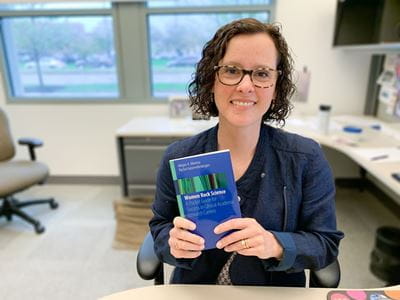More women are seizing careers in academic medicine than ever before. With it, they bring a new set of skills that could change the face of leadership in science. Rachel Katzenellenbogen, MD, wants to help them make the most of it.
Rachel Katzenellenbogen, MD
Katzenellenbogen, an Indiana University School of Medicine researcher and physician, and her University of Wisconsin colleague, Megan Moreno, MD, have literally written the book on how to best leverage their unique talents and resources when forging a career in academic medicine.
“Our intention was to create something that is fun to read and explores ways to interpret careers in academic medicine that maybe you hadn’t thought about before,” Katzenellenbogen said. “I hope readers recognize that they do not—cannot—exist in a vacuum. Your colleagues and environment either passively or actively play a role. Our book wants to help you tap into the resources that can help any woman’s research career be fruitful.”
Charting a course
The book, titled “Women Rock Science: A pocket guide for success in clinical academic research careers,” was published in April 2019. The authors’ goal for the book is to help women navigate the toughest decisions they’ll encounter while pursuing a successful career in clinical research.
Katzenellenbogen knows a thing or two about being a woman in science. After completing her undergraduate degree in chemistry at Harvard University and obtaining her medical degree from the Johns Hopkins School of Medicine, she trained at the University of Washington, where she met her co-author, prior to becoming the inaugural Chuck and Tina Pagano Scholar at IU School of Medicine. Today, Katzenellenbogen is a practicing physician with the IU Health network and runs a successful research laboratory investigating the mechanisms of human papilloma virus (HPV) that contribute to the development of cancer.
Choosing carefully
Despite a strong presence of women studying science and medicine, Katzenellenbogen said she is troubled by the lack of advancement these women are achieving later in their careers.
“There are as many women as men who are enrolled in medical schools across the country. That being said, there are not as many women in leadership positions,” Katzenellenbogen said. “We thought it was important to talk about women in science because girls are clearly interested in it, but they aren’t equally represented as their careers progress.”
The co-authors applied their real-life experiences—and insight from some of the nation’s leading women in science—to guide future researchers through the critical choices that can make or break a career in academic medicine. Choices such as: When is the right time to change institutions? When should a clinical researcher begin to develop a national position in a professional society? What are the best ways to engage with colleagues and potential collaborators?
According to Katzenellenbogen, the book engages readers on a deeper, more personal level as well.
Pausing for reflection
Rachel Katzenellenbogen, MD, works in her laboratory.
“Our book doesn’t just consist of tips and tricks for medical research careers, but also encourages readers to reflect on their own professional purpose,” she said. “We encourage readers to consider questions like, ‘What is my personal mission statement? What are the ways that I want to engage in the mission statement of my research institution? In what ways can I develop others to contribute to the development, diversity and wellness of the institution’s faculty?’”
Katzenellenbogen said that a personal mission statement can be a guiding light for navigating a happy and fulfilling career. In academic medicine, where roles are multifaceted and opportunities are vast, she said that it’s important to return to this purpose over time and allow it to evolve.
In fact, “Women Rock Science” is written to encourage readers to leverage the resources available within this evolving context. Whether pursuing an advanced degree, finishing a fellowship or accepting their first career development award, Katzenellenbogen said she hopes readers will find the book valuable throughout all stages of their careers—from the journey toward independent research to mentoring the next generation of rock stars.
Rachel Katzenellenbogen, MD, is an associate professor of pediatrics in adolescent medicine and an associate professor of microbiology and immunology at Indiana University School of Medicine. She conducts her research within the Indiana University Melvin and Bren Simon Cancer Center and the Herman B Wells Center for Pediatric Research. To learn more about her research, visit the Katzenellenbogen Lab page.
